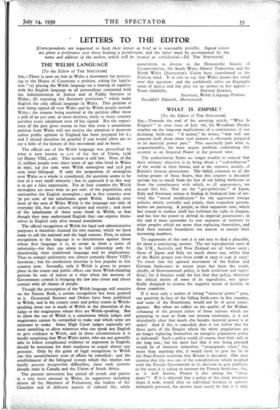' LETTERS TO THE EDITOR
[Correspondents are requested to keep their letters as brief as is reasonably possible. Signed letters are given a preference over those bearing a pseudonym, and the latter must be accompanied by the name and address of the author, which will be treated as confidential.—Ed. THE SPECTATOR]
THE WELSH LANGUAGE
[To the Editor of THE SPECTATOR]
SIR,—There is now on foot in Wales a movement for present- ing to the House of Commons a petition, asking for legisla- tion "(a) placing the Welsh language on a footing of equality with the English language in all proceedings connected with the Administration of Justice and of Public Services in Wales ; (b) repealing the Statutory provisions " which make English the only official language in Wales. This petition is now being signed all over Wales and by Welsh people outside Wales ; the returns being received at the petition office show a poll of 90 per cent. in most districts, while in many country parishes every inhabitant over 18 has signed. But the experi- ence of the past gives reason to fear that even a unanimous petition from Wales will not receive the attention it deserves unless public opinion in England has been prepared for it ; and I should therefore be grateful if you would allow me to say a little of the history of this movement and its bases.
The official use of the Welsh language was proscribed by what is now known as s.17 of the Act of Union, 1536 (27 Henry VIII, c.26). This section is still law. Now, of the million people over three years of age who lived in Wales in 1931, 3.9 per cent, were Welsh monoglots and 32.8 per cent. were bilingual. If only the proportion of monoglots over Wales as a whole is considered, the question seems to be that of a very small minority ; but to approach it in this way is to get a false impression. For in four counties the Welsh monoglots are more than zo per cent. of the population, and outnumber the English monoglots ; and in five counties over 79 per cent. of the inhabitants speak Welsh. Indeed, over most of the area of Wales Welsh is the language not only of everyday life, but of culture, religion and society ; and most of the inhabitants of these areas think in Welsh, so that though they may understand English they can express them- selves in English only after mental translation.
The official recognition of Welsh for legal and administrative purposes is therefore claimed for two reasons, which we have come to call the national and the legal reasons. First, to refuse recognition to the language is to discriminate against those whose first language it is, to create in them a sense of inferiority—for they can attain to full citizenship only by abandoning their traditional language and its implications. Thus to compel uniformity was almost certainly Henry VIII's intention ; but his totalitarian doctrine is less popular in this country now. Secondly, only if Welsh is given its proper place in the courts and public offices can these Welsh-thinking persons be sure of justice at a time when the increase of Government control is bringing the law into closer and closer contact with all classes of people.
Though the proscription of the Welsh language still remains on the Statute Book, a certain recognition has been granted to it. Occasional Statutes and Orders have been published in Welsh, and in the county court and police courts in Welsh- speaking areas use is made of Welsh at the discretion of the judge or the magistrates where they are Welsh-speaking. But to allow the use of Welsh is a concession which judges and magistrates cannot be compelled to make and which some are reluctant to make. Some High Court judges especially are most unwilling to allow witnesses who can speak any English to give evidence in Welsh, and in those circumstances it is hardly surprising that West Wales juries, who are not generally able to follow complicated evidence or argument in English, should be notorious for their readiness to acquit almost any prisoner. Only by the grant of legal recognition to Welsh can this unsatisfactory state of affairs be remedied: and the establishment of the bilingual system which this implies can hardly present insuperable difficulties, since such systems already exist in Cailada and the Union of South Africa.
The present movement has united all creeds and parties in a way most unusual in Wales, its supporters including almost all the Members of Parliament, the leaders of the Churches and of different aspects of cultural life, while
associations as diverse as the Honourable Society of Cyau-nrodorion, the South Wales Miners' Federation and the North Wales Quarrymen's Union have contributed to the Petition fund. It is safe to say that Wales knows her mind over this question : and she confidently relies on England's sense of justice and fair play for an answer to Ilsr appeal.—
Secretary, Welsh Language Petition. Swyddfa'r Ddeiseb, Aberystwyth.










































 Previous page
Previous page